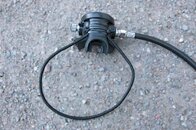It's interesting, the way you guys are setting up your gear. Most of us who hang the backup reg around our necks are intending to use it ourselves, and donate the regulator we are breathing. But the Manta necklaces don't hang onto the reg very hard, so I suppose one could use them as an octo-holder.
You did a lot of things right, including breathing from the reg while watching the gauge before the dive (an excellent practice). But as I have learned any number of times, if you have to take gear off or apart to fix a problem, you have to approach the gear check all over again. It's a good lesson to remember, and thank you for telling a story that illustrates it so well.
Otherwise, I think your solutions were fine. A major malfunction on descent should be dealt with, in most cases, by a return to the surface. I learned that lesson vividly -- I did a dive with a new instructor, who threw a failure at me and my buddy when we were just underwater. We spent the next eight minutes gracefully dancing through the whole set of procedures to cope with the failure, and I was congratulating myself on how well we had done as we ascended. As my head broke the surface, the instructor growled, "What the *&#@ were you thinking!" I blinked at him, baffled, and he went on, "If you had an inflator runaway in five feet of water at the beginning of the dive, would you really spend EIGHT MINUTES underwater trying to fix it?" Lesson learned -- failures at the beginning, near the surface, are best dealt with ON the surface.
We can argue about whether you should have dumped his weights -- I wouldn't have; I would have done just what you did. Once you are on the surface, he can orally inflate his BC to stay there. Only if he were too panicked to do that, would I have dropped weight. After all, the failure you had was not actually going to preclude you going on to dive, if he wasn't too rattled, but dropping his weight would.
And to tell another story on myself, I dropped underwater once on a stage bottle I hadn't turned on. I got about four feet down and "ran out of gas". Even though running out of gas wasn't even a remote possibility, because in addition to the bottle I was breathing, I had 150 cubic feet of gas on my back, I still had a moment of sheer adrenaline and the thought, "I need to get out of here" and I started swimming upward just as my brain engaged and I realized I just had to turn a valve on. So even somebody with years and hundred of dives can be rather seriously rattled by suddenly finding herself out of gas -- I think you guys handled it just fine!






